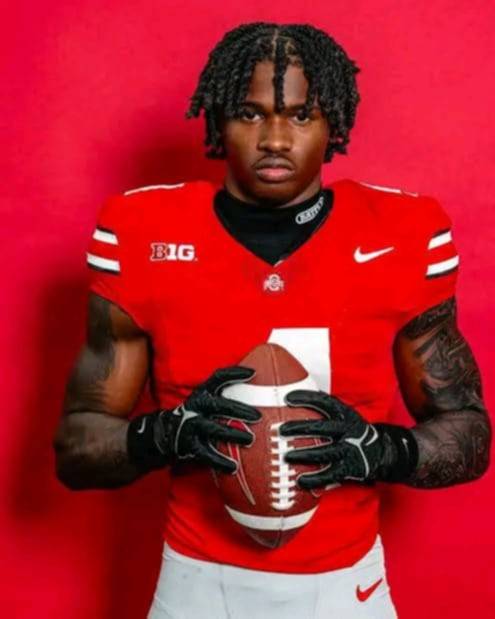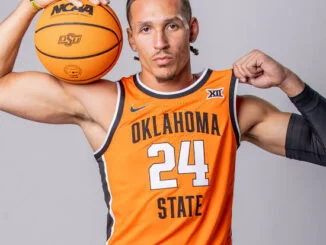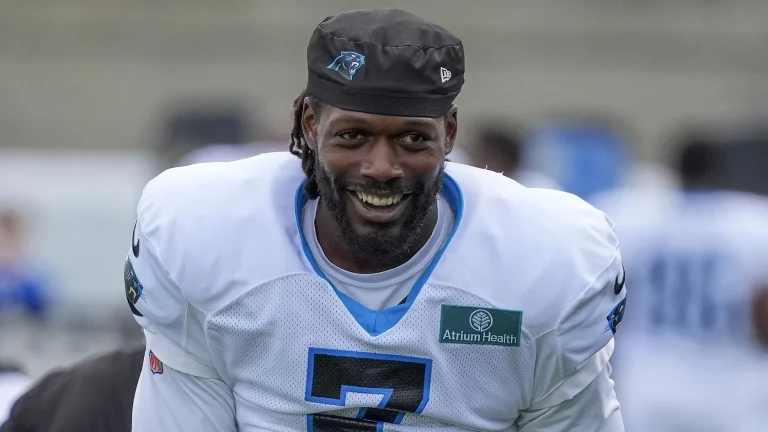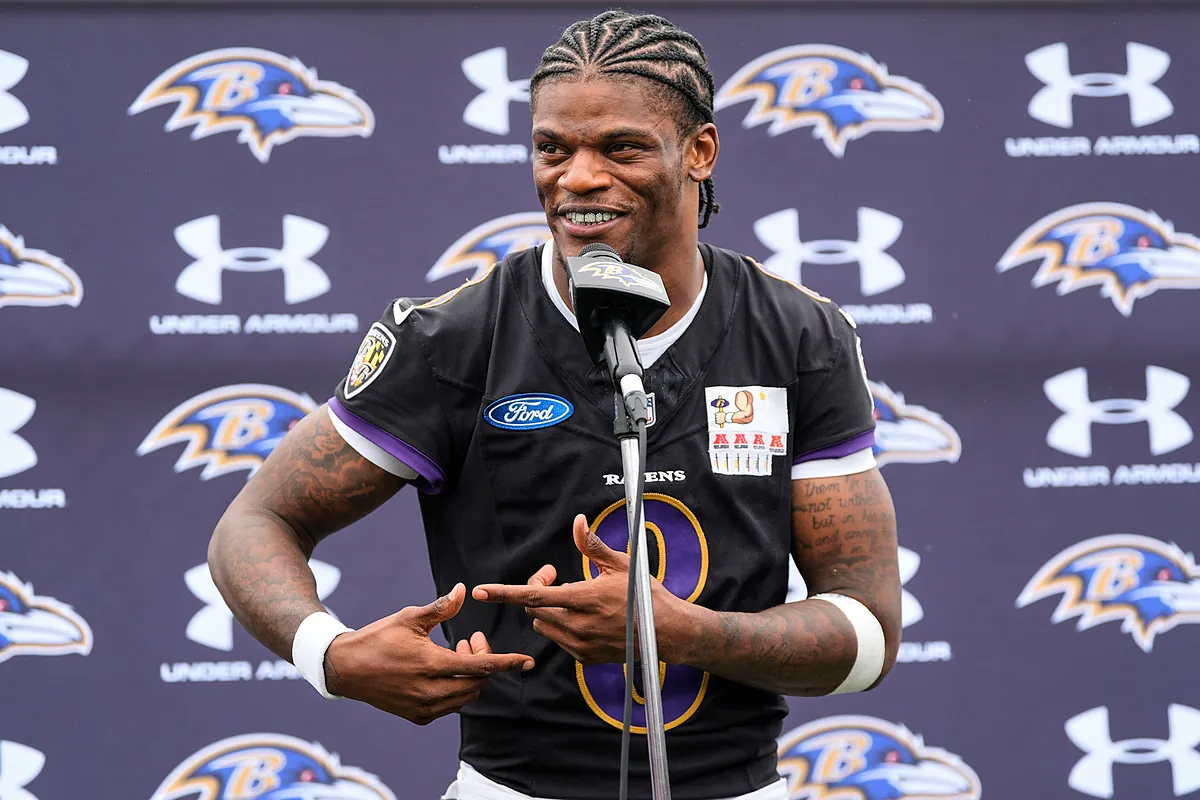In a world where fame and fortune often fuel self-indulgence and personal branding, Ohio State Buckeyes football superstar Jeremiah Smith has chosen a remarkably different path—one of humility, compassion, and purpose. The electrifying wide receiver, widely hailed as one of the most talented prospects in college football, has shocked the sports world not for anything he did on the field—but for what he did off of it. In a move that defies the norms of modern-day stardom, Smith announced that he is donating the entirety of his \$2 million bonus and sponsorship package to various charities and homeless relief organizations. His decision has sent shockwaves through both the college football community and the broader national conversation surrounding athlete activism and social responsibility.
Jeremiah Smith’s statement was delivered with the kind of authenticity and emotional gravity that resonated far beyond Buckeye Nation. “There are millions of people struggling every day — families without homes, kids without food, veterans without support,” he said in a brief but powerful public address. “If I can be a light in even one of those lives, then every touchdown, every yard, every second I’ve spent training is worth it. We’re all part of something bigger than ourselves.” It was a moment that reminded the nation that integrity and character still matter deeply—and that real leadership extends far beyond the boundaries of a football field.
At just nineteen years old, Jeremiah Smith has shown a level of maturity and altruism that many spend a lifetime aspiring to. His donation, one of the largest ever made by a college athlete, will be distributed across a broad range of causes. A significant portion is earmarked for homeless shelters in Ohio and his hometown of South Florida, including funding for transitional housing programs, mental health counseling, and job placement services. Another large share is going toward organizations that provide meals and basic necessities to food-insecure families across the Midwest. And finally, Smith is allocating funds to nonprofits that support military veterans, particularly those battling PTSD and struggling to reintegrate into civilian life.
The response has been overwhelming. Teammates, coaches, university administrators, and fans have all weighed in with admiration and gratitude. Ohio State head coach Ryan Day called Smith’s decision “one of the most inspiring acts of selflessness I’ve witnessed in my entire coaching career.” Athletic Director Gene Smith said the move represents “everything Ohio State hopes to instill in its student-athletes: leadership, compassion, and a deep commitment to serving others.” Fans flooded social media with praise, some calling him “the next Tim Tebow” and others suggesting his gesture should become a model for how high-profile athletes use their influence and income.
This landmark donation is particularly significant in the era of NIL (Name, Image, and Likeness) agreements, which have transformed the financial landscape of college athletics. For many elite athletes, seven-figure deals are now routine, and Jeremiah Smith was no exception. With multiple high-profile sponsors lining up to be associated with his talent and character, he could have easily used his new wealth for personal luxuries. Instead, he chose a path of giving that many would consider extraordinary. It challenges the perception that NIL money is simply a means for athletes to enrich themselves and puts forward a compelling case that these earnings can be leveraged to drive meaningful societal change.
The story of Jeremiah Smith is also deeply rooted in his upbringing and personal values. Raised in a modest household where faith, community, and perseverance were emphasized, Smith often speaks about the importance of remembering where you came from. He has talked openly about friends and neighbors who battled homelessness and poverty, and how those experiences shaped his worldview. Even as his star began to rise in high school and eventually with the Buckeyes, he never lost sight of the bigger picture. Those who know him best say his donation wasn’t a publicity stunt or a calculated career move—it was simply who he is.
The decision has also sparked dialogue across the sports world about how young athletes can make a difference. Several professional players, including NFL stars and former Ohio State alumni, publicly applauded Smith’s gesture. Some even committed to matching portions of his donation, effectively turning his initial \$2 million gift into a cascading wave of generosity. Media outlets across the country have featured his story, using it as a symbol of what’s possible when passion meets purpose. Prominent voices in education, religion, and philanthropy have called on other universities to highlight stories like Smith’s as examples of the kind of moral leadership young people should strive for.
What makes this moment even more remarkable is that Jeremiah Smith is still in the early stages of his college career. He’s expected to be a first-round NFL draft pick and, barring injury, could command a multimillion-dollar contract once he goes pro. But instead of waiting for that day to start making a difference, he chose to act now. His message is clear: you don’t need to be rich to be generous, and you don’t need to be famous to change lives. That kind of wisdom, coming from someone his age, has drawn comparisons to some of the most impactful athlete-activists in history.
Beyond the numbers and headlines, the human impact of Smith’s donation is already being felt. In Columbus, several shelters reported receiving checks from the newly launched “Jeremiah Smith Foundation,” with funds allocated toward purchasing winter coats, hygiene products, and school supplies. In Miami, his high school alma mater will receive funding for an after-school program designed to keep at-risk youth off the streets. And in Cleveland, a veterans’ center is preparing to open a new wing thanks to his support. These are not vague promises or symbolic gestures—they are concrete, life-changing actions with measurable outcomes.
His story has also reignited conversations on college campuses about the purpose of education and athletics. Should universities do more to support social responsibility among athletes? Could NIL contracts include options for charitable matching or community involvement clauses? Is there more that athletic departments can do to channel the energy and influence of star players toward causes that matter? While not everyone will—or can—donate millions, Smith’s example proves that even in the ultra-competitive world of college football, empathy and generosity still have a powerful place.
The NCAA, often criticized for its slow response to modern challenges, issued a rare public commendation, stating that Jeremiah Smith’s actions “represent the highest ideals of student-athlete leadership and civic engagement.” Even political leaders weighed in, with Ohio Governor Mike DeWine praising Smith during a press conference and hinting at a possible state-level initiative inspired by the donation.
For Smith, the attention is secondary. Those close to him say he is already back at practice, focused on preparing for the upcoming season. His goal remains unchanged: help Ohio State win a national championship and grow into the best version of himself, both on and off the field. But whether he scores a game-winning touchdown or never touches the ball again, his legacy is already firmly rooted in something deeper than football. He has become a symbol of hope—a living reminder that character, compassion, and courage still matter in sports, and in life.
It’s not hard to imagine a future in which Jeremiah Smith becomes a household name in the NFL, earning accolades and setting records. But it’s just as easy to imagine him running a nonprofit, testifying before Congress on homelessness, or launching national initiatives aimed at social equity. His trajectory seems limitless not because of his speed or hands—but because of his heart.
As the college football season kicks off, all eyes will naturally be on Jeremiah Smith’s performance between the lines. But for those who’ve heard his message and seen his example, the more important story is the one that won’t show up on a stat sheet. It’s the story of a young man who decided that greatness isn’t just about how high you climb—but how many people you lift as you rise. In the process, Jeremiah Smith has done more than just donate money—he’s donated hope. And in a time when the world sorely needs it, that may be the most valuable gift of all.



